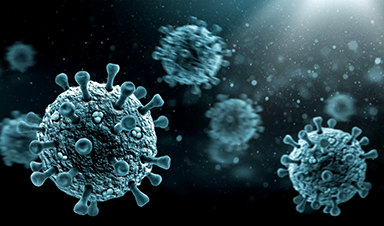The mere scent of seafood can severely sicken those allergic to it — and therefore they are more likely to avoid it. Similarly, individuals who experience food poisoning from a specific dish tend to avoid it afterward.
For a long time, researchers have understood that our immune system plays a key role in our reactions to allergens and pathogens in the environment. However, it was unclear whether it played any role in prompting these types of behaviors toward allergic triggers.
According to Yale-led research recently published in the journal Nature, it turns out that the immune system plays a crucial role in changing our behaviors.
Without immune system communication, the brain does not warn the body about potential dangers in the environment and does not try to avoid those threats, the study shows.
A team in the Medzhitov lab, led by Esther Florsheim, at the time a postdoctoral researcher at Yale and now an assistant professor at Arizona State University, and Nathaniel Bachtel, a graduate student at the School of Medicine, studied mice that had been sensitized to have allergic reactions to ova, a protein found in chicken eggs. As expected, these mice tended to avoid water laced with ova, while control mice tended to prefer ova-laced water sources. The aversion to ova-laced water sources in sensitized mice lasted for months, they found.
The team then examined whether they could alter the behavior of sensitized mice by manipulating immune system variables. They found, for instance, that mice allergic to ova lost their aversion to the protein in their water if Immunoglobulin E (IgE) antibodies, produced by the immune system, were blocked. IgE antibodies trigger the release of mast cells, a type of white blood cell that, along with other immune system proteins, plays a crucial role in communicating to areas of the brain that control aversion behavior. Without IgE as an initiator, the transmission of information was interrupted, so that mice no longer avoided the allergen.
Medzhitov said that the findings illustrate how the immune system evolved to help animals avoid dangerous ecological niches. Understanding how the immune system memorizes potential dangers, he added, could one day help suppress excessive reactions to many allergens and other pathogens.
Reference: “Immune sensing of food allergens promotes avoidance behaviour” by Esther B. Florsheim, Nathaniel D. Bachtel, Jaime L. Cullen, Bruna G. C. Lima, Mahdieh Godazgar, Fernando Carvalho, Carolina P. Chatain, Marcelo R. Zimmer, Cuiling Zhang, Gregory Gautier, Pierre Launay, Andrew Wang, Marcelo O. Dietrich and Ruslan Medzhitov, 12 July 2023, Nature.
DOI: 10.1038/s41586-023-06362-4
News
Enhanced Antibacterial Polylactic Acid-Curcumin Nanofibers for Wound Dressing
Background Wound healing is a complex physiological process that can be compromised by infection and impaired tissue regeneration. Conventional dressings, typically made from natural fibers such as cotton or linen, offer limited functionality. Nanofiber [...]
Global Nanomaterial Regulation: A Country-by-Country Comparison
Nanomaterials are materials with at least one dimension smaller than 100 nanometres (about 100,000 times thinner than a human hair). Because of their tiny size, they have unique properties that can be useful in [...]
Pandemic Potential: Scientists Discover 3 Hotspots of Deadly Emerging Disease in the US
Virginia Tech researchers discovered six new rodent carriers of hantavirus and identified U.S. hotspots, highlighting the virus’s adaptability and the impact of climate and ecology on its spread. Hantavirus recently drew public attention following reports [...]
Studies detail high rates of long COVID among healthcare, dental workers
Researchers have estimated approximately 8% of Americas have ever experienced long COVID, or lasting symptoms, following an acute COVID-19 infection. Now two recent international studies suggest that the percentage is much higher among healthcare workers [...]
Melting Arctic Ice May Unleash Ancient Deadly Diseases, Scientists Warn
Melting Arctic ice increases human and animal interactions, raising the risk of infectious disease spread. Researchers urge early intervention and surveillance. Climate change is opening new pathways for the spread of infectious diseases such [...]
Scientists May Have Found a Secret Weapon To Stop Pancreatic Cancer Before It Starts
Researchers at Cold Spring Harbor Laboratory have found that blocking the FGFR2 and EGFR genes can stop early-stage pancreatic cancer from progressing, offering a promising path toward prevention. Pancreatic cancer is expected to become [...]
Breakthrough Drug Restores Vision: Researchers Successfully Reverse Retinal Damage
Blocking the PROX1 protein allowed KAIST researchers to regenerate damaged retinas and restore vision in mice. Vision is one of the most important human senses, yet more than 300 million people around the world are at [...]
Differentiating cancerous and healthy cells through motion analysis
Researchers from Tokyo Metropolitan University have found that the motion of unlabeled cells can be used to tell whether they are cancerous or healthy. They observed malignant fibrosarcoma [...]
This Tiny Cellular Gate Could Be the Key to Curing Cancer – And Regrowing Hair
After more than five decades of mystery, scientists have finally unveiled the detailed structure and function of a long-theorized molecular machine in our mitochondria — the mitochondrial pyruvate carrier. This microscopic gatekeeper controls how [...]
Unlocking Vision’s Secrets: Researchers Reveal 3D Structure of Key Eye Protein
Researchers have uncovered the 3D structure of RBP3, a key protein in vision, revealing how it transports retinoids and fatty acids and how its dysfunction may lead to retinal diseases. Proteins play a critical [...]
5 Key Facts About Nanoplastics and How They Affect the Human Body
Nanoplastics are typically defined as plastic particles smaller than 1000 nanometers. These particles are increasingly being detected in human tissues: they can bypass biological barriers, accumulate in organs, and may influence health in ways [...]
Measles Is Back: Doctors Warn of Dangerous Surge Across the U.S.
Parents are encouraged to contact their pediatrician if their child has been exposed to measles or is showing symptoms. Pediatric infectious disease experts are emphasizing the critical importance of measles vaccination, as the highly [...]
AI at the Speed of Light: How Silicon Photonics Are Reinventing Hardware
A cutting-edge AI acceleration platform powered by light rather than electricity could revolutionize how AI is trained and deployed. Using photonic integrated circuits made from advanced III-V semiconductors, researchers have developed a system that vastly [...]
A Grain of Brain, 523 Million Synapses, Most Complicated Neuroscience Experiment Ever Attempted
A team of over 150 scientists has achieved what once seemed impossible: a complete wiring and activity map of a tiny section of a mammalian brain. This feat, part of the MICrONS Project, rivals [...]
The Secret “Radar” Bacteria Use To Outsmart Their Enemies
A chemical radar allows bacteria to sense and eliminate predators. Investigating how microorganisms communicate deepens our understanding of the complex ecological interactions that shape our environment is an area of key focus for the [...]
Psychologists explore ethical issues associated with human-AI relationships
It's becoming increasingly commonplace for people to develop intimate, long-term relationships with artificial intelligence (AI) technologies. At their extreme, people have "married" their AI companions in non-legally binding ceremonies, and at least two people [...]





















